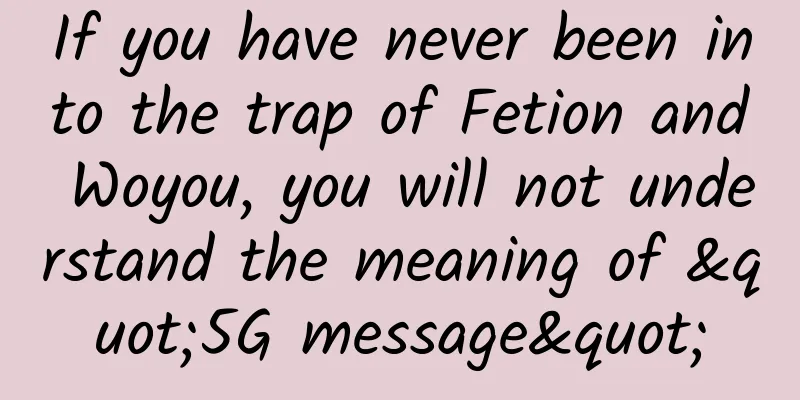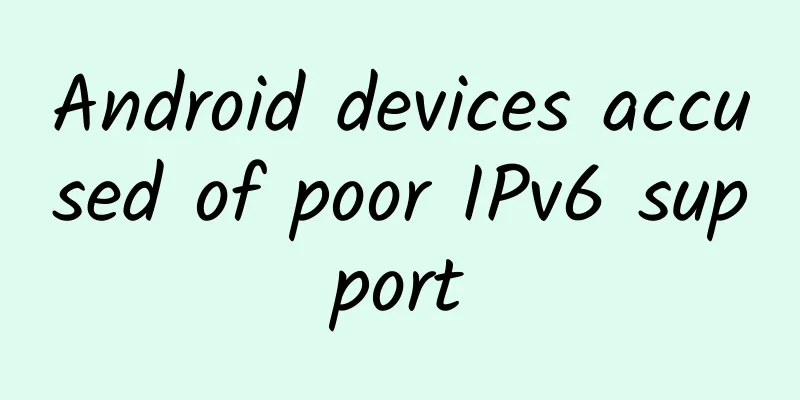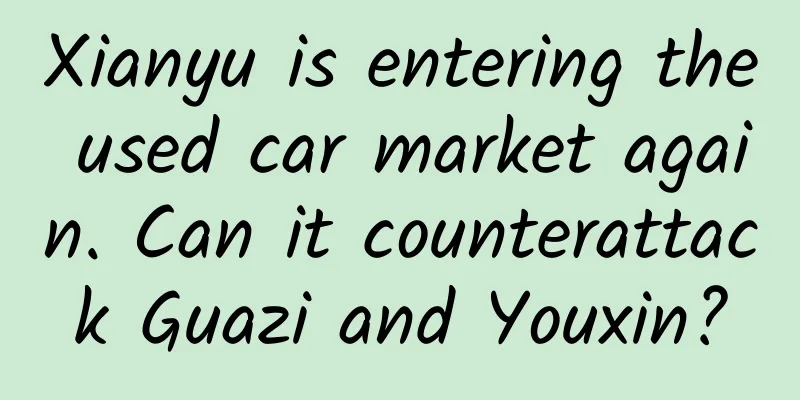If you have never been into the trap of Fetion and Woyou, you will not understand the meaning of "5G message"

|
In the 5G era, if operators do not engage in self-disruptive innovation, their value will be further diluted: on the one hand, revenue is declining, and on the other hand, infrastructure investment is huge. It is a critical moment for operators to find ways to break through.
In fact, from the 2G, 3G to 4G era, a number of operators have been working hard on Internet applications such as MMS, Fetion, and Fetion. However, the reality is that operators are still operators, and pipelines have become the skin that the three major operators cannot shed along the way. Perhaps, creating a product that perfectly integrates "network + terminal + product" is the operator's biggest dream. With the rapid implementation of 5G scenarios, operators are once again unable to hold back in seeking changes in Internet content applications. Recently, China Mobile, China Telecom, and China Unicom jointly held an online press conference and jointly released the "5G Message White Paper". The three parties announced that they will upgrade the traditional SMS service to RCS (Rich Communication Services & Suite, RCS for short) in the 5G era. In this regard, some people in the industry believe that the three major operators are banding together to benchmark WeChat and Alipay. So, what are the operators' considerations behind this move? Can the operators' dream of using "5G messages" to extend the life of SMS come true? Can “5G Messages” extend the life of SMS? It is understood that "5G Message" supports text, pictures, videos, emoticons and other content, supports online and offline messages, and can provide users with message status reports and message history management. Negative views mainly focus on the pessimism about operators' converged communication (RCS) products. Specifically, the RCS promoted by the three major operators is to upgrade SMS to RCS messages, and integrate advanced messaging functions and standard interfaces into chatbots and plug-ins, so that users can search, interact and experience services in the message window without application mode. The product form is displayed in rich media forms such as pictures, texts, traffic red envelopes, and videos. Indeed, compared with 3G and 4G, 5G communication technology has the characteristics of wider bandwidth, faster speed and better signal, which will inevitably make the application scenarios of 5G more diversified. In other words, 5G messages are no longer based on 2G, 3G, and 4G signaling channels to send text messages, but similar to VoLTE, use media channels to send rich media information. However, it is worth noting that 5G messaging has not surpassed killer apps like WeChat. Such a product, which is extremely challenging for operators to "operate", also allows individual users to communicate through text, pictures, emoticons, videos, etc., while also following the example of WeChat to connect public accounts and service accounts, connecting enterprises and individual users. At this point, it is ridiculous that some professionals point out that "5G messaging" is not a new technology. Its essence - RCS is a concept that has existed for more than 10 years. In fact, the new and old concepts are not worth a long article, but if the appeal of "5G Message" is just to benchmark WeChat, or if telecom operators fight back against the previous OTT tribulations in the 5G era, its development prospects cannot but be questioned. After all, if it is just imitation without surpassing, why should hundreds of millions of users abandon WeChat, Alipay, etc. and turn to "5G Message"? After all, the migration of social assets means huge costs. Unless more than 80% of a user's friends switch to "5G messaging", 5G messaging can only quench thirst. For the three major operators, 5G is actually more of a challenge than an opportunity. If they cannot come up with innovations that surpass WeChat, the dilemma of its pipeline will still be a difficult problem to solve, let alone extend the life of SMS. The reason for saying this is that with the previous failures of Fetion (Feiliao) and other services as a lesson, we can see the big pitfalls caused by the operators' excessive sense of superiority and blind self-confidence. MMS was a flash in the pan, and Fetion and Fetion Chat were unable to resolve operational difficulties It goes without saying that MMS is a failure. Before the emergence of WeChat, operators, especially China Mobile, developed Fetion, which once made people believe that it was the best instant messaging tool in the operator era. However, although the operators thought they had the largest user base in the world, they only needed to put instant messaging tools like Fetion there and wait for users to come and even pay. But one problem that cannot be ignored is that the operators’ self-isolation and inaction in social and content operations made them think that Fetion was the “chosen one” and that no new application would end its fate. Moreover, at that time, China Unicom also launched its own application in a hurry, just for the purpose of making a chat tool. In the "best era", operators only competed with each other, and this competition was not market-oriented enough, so that each of them reaped the fruits of their own labor without feeling the slightest sense of crisis brought about by the invasion of alien species. Things are always beyond human control, and it is even more impossible for operators to assume that everything will remain calm forever. WeChat suddenly disrupted everything. In fact, when WeChat first appeared, operators did not realize how dangerous it would be, because they hardly took WeChat seriously. However, after WeChat launched its voice service in 2011, the operators were stunned. This "freak" that would kill voice calls and information services was rapidly eroding the profit space that originally belonged to the operators, and it was also attracting hundreds of millions of users from the operators to its own services. In fact, it is worth mentioning that Fetion originally had great potential. However, due to the lack of interconnection between China Mobile, China Unicom and China Telecom at that time, the relatively closed Fetion and Woyou eventually disappeared. Can the role of "plumber" regain its voice in 5G? It is not an exaggeration to describe the role of the three major operators in the past years as plumbers. In recent years, operators have been competing with Internet applications such as WeChat and Alipay for the dividends of the mobile Internet market. However, the facts prove that the operators are still a little behind. From the lukewarm popularity of MMS in the 2G era to the hot but quickly declining popularity and exit from the market of Fetion in the 3G era, it must be said that the operators "led" by China Mobile have made little achievement in the field of Internet content. The reason for this dismal result is actually due to the operators' sense of superiority and their lack of awareness of the operations of Internet content and mobile social networking. As the saying goes, "If you are good at one thing, you must master it". The duty of operators is to build communication infrastructure. Asking them to develop and promote more mobile Internet applications is beyond their ability. Moreover, operators like China Mobile cannot interconnect with users of China Unicom and China Telecom when developing Fetion, which also highlights another problem, that is, the operators are closed. And closed practices and thinking will naturally lead to closed consequences, allowing open applications such as WeChat to grow rapidly. Of course, whether in the 4G era or the future 5G era, traffic entry and scene penetration are important. WeChat and Alipay have already seized the scene and traffic. Although China Telecom's Wing Pay is still available, its influence is far from comparable to the former two. This also shows that in the competition for traffic and scenarios, operators are once again late to the party. Now facing the huge opportunities brought by the 5G era, operators have united to take "5G messaging" as the vanguard. Although it may produce temporary pleasure after huge investment, if it cannot surpass existing applications such as WeChat and Alipay in terms of traffic, scenarios, and entrances, then even in the new era, the operator's pipeline label will still be difficult to remove. Looking through the data from ten years ago, we can see that the relevant data from the Ministry of Industry and Information Technology shows that in March 2010, the number of short messages sent nationwide was 66.53 billion, a year-on-year decrease of 4.5% (the first significant decrease). China Mobile's financial report shows that its SMS and MMS business revenue fell for the first time in 2011, reaching 46.462 billion yuan, lower than 46.889 billion yuan in 2010. These figures may not have alerted operators ten years ago, and some current data changes may still not alert them. The three major operators that have become pipelines want to compete for the market with 5G messages, but user habits and industrial ecology will not change according to human will. In February 2020, the Ministry of Industry and Information Technology released the "2019 Communications Industry Statistical Bulletin", which showed that the continuous penetration of security-related services such as network login and user identity authentication has greatly increased the volume of mobile SMS business, but the revenue of related business has not increased. In 2019, the volume of mobile SMS business in China increased by 37.5% year-on-year, an increase of 23.5 percentage points over the previous year; the revenue of mobile SMS business reached 39.2 billion yuan, which was the same as the previous year. Obviously, this is exactly the weakness of pipeline operators in value-added services. Conclusion We can be sure that in the 5G era, the SMS business volume of operators will only increase and not decrease, but there are big questions about how much "oil and water" and ecology "5G messages" can bring to operators, and how they will reconstruct both the supply and demand sides, not to mention "extending the life" of SMS. There is a cliché: My Lord, times have changed. There is also a less cliché: Old wine in new bottles, the more you drink, the less there is. |
<<: Between the two generations of iPhone SE, Apple has quietly changed
>>: Google debit card exposed! Will the competition among US mobile payment giants escalate?
Recommend
Urinary Health Day丨Be careful! When urine turns yellow, your body is "reporting" these things to you
Experts in this article: Wang Bin, Department of ...
This action you often do may allow your neck to support the weight of four more heads?
If you are reading this article, please think bac...
5G mobile phone chip market: many players are competing for the market, making plans, grabbing positions, and accelerating their pace
The 5G world is surging in 2019. The communicatio...
SMMT: Tesla's sales in February 2025 increased by 20.7% year-on-year, and its market share increased by 4.6%
Tesla's sales in the UK rose by more than a f...
If you don’t recognize these flowers while going on an outing, how can you still post them on your Moments?
Mixed Knowledge Specially designed to cure confus...
Jilin SEO Training: What are the methods of Baidu promotion? What methods can SEO use?
There are many SEO methods to meet the needs of d...
South Korean research institute: iPhone emits twice as much electromagnetic radiation as Samsung phones
Apple Inc's iPhone and iPad have the highest ...
China Automobile Dealers Association: Auto dealer inventory coefficient is 1.35 in June 2023
On July 10, 2023, the China Automobile Dealers As...
Beijing Winter Olympics: How does China produce the world's "fastest" ice?
Mixed Knowledge Specially designed to cure confus...
Note: You can breathe normally while reading this article
Review of this article: Zhang Ying, emergency sci...
Use 8 real cases to look at the current survival status and solutions of the operation group!
In the past six months, I have communicated with ...
Xigua Video product analysis report!
As a product of Toutiao, Xigua Video has been aro...
Three common breakfast combinations are actually very unhealthy. Are you one of them?
Recently, the topic #Skipping breakfast makes you...
Cocos 2015 Developer Conference (Spring) is about to open
The "Cocos 2015 Developer Conference (Spring...
Information flow advertising account optimization methodology, account optimization from 5 directions and dimensions
When doing information flow advertising , I swear...









